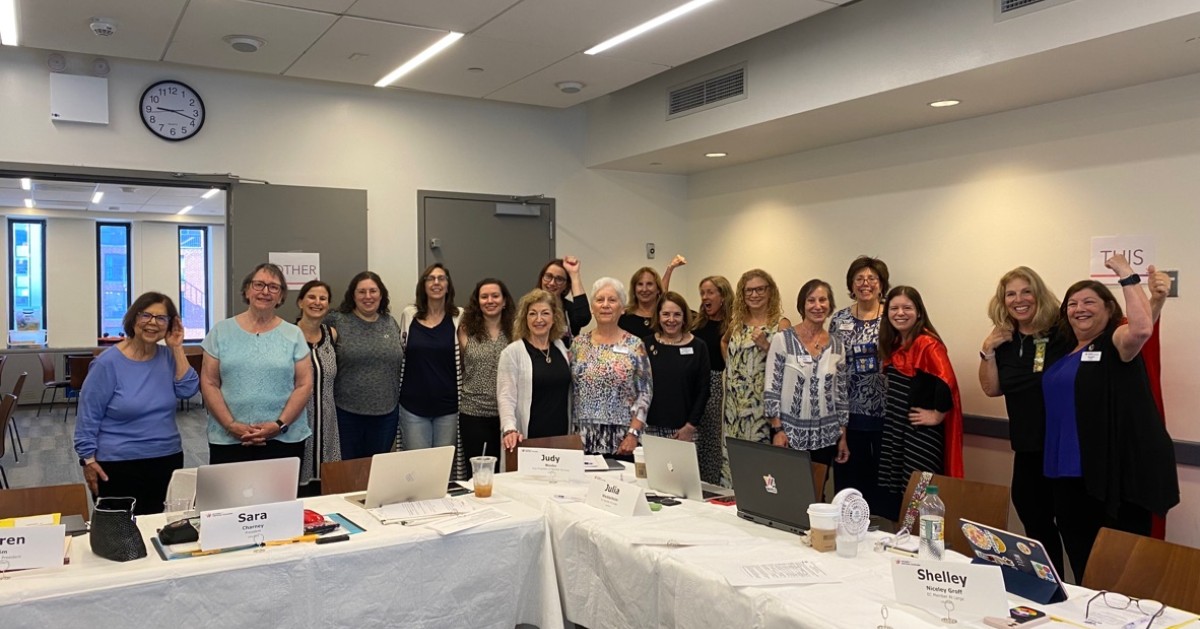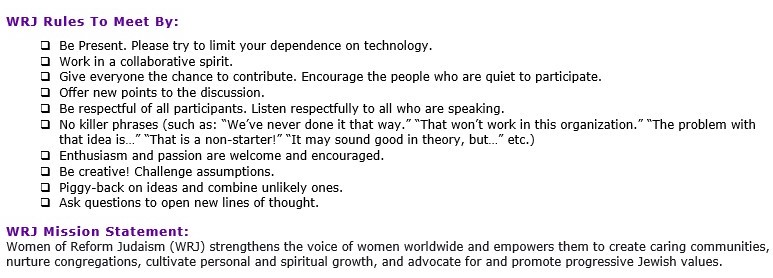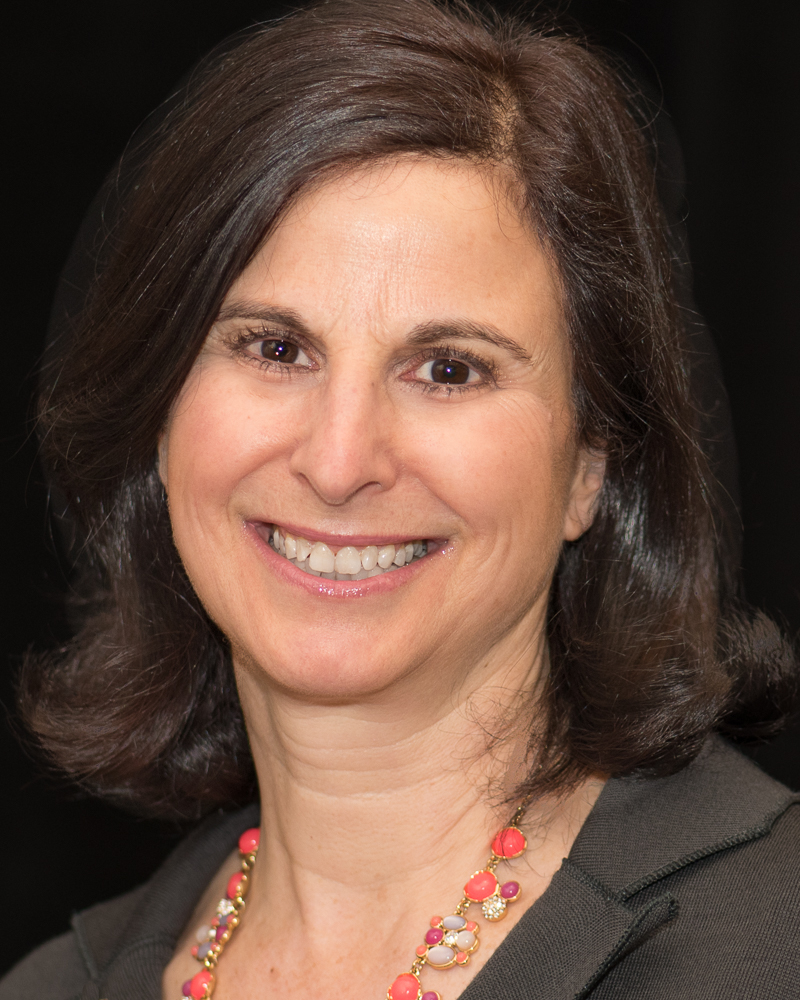
And, we’re off! Many of us have worked over the summer with friends and colleagues to set the calendar for the year ahead, including meetings, events, and other opportunities for gathering. September is here and with the joy and anticipation of Tishrei around the corner, and generally of being in-person, we are raring to go. Let’s take a deep dive into creating a space of safety and belonging for all who wish to join us.
Welcome Message
Send a welcome message as a part of your Temple’s e-blasts, as well as a separate welcome note to your women’s group. Here are some items to include:
- Introduce yourself/yourselves (President/Leadership Council), including your names and pronouns
- Welcome all and share your sisterhood's/women’s group’s:
- Mission statement
- Statement of values
- Organizational culture expectations and strategies (more on this later)
- Links to your website and social media accounts
- Ways to get involved and why people should notice and participate in what you are offering
- District and WRJ upcoming programs
- Contact information
While it is important for a women’s group to have up-to-date by-laws, it is more significant to cultivate an organizational culture of accountability, safety, and respect. We achieve this by looking both outwards and inwards. Your outward-facing messaging is the first thing that most folks will notice. Is the information on your website – via your Temple’s or your own unique site – current, with details about your leadership, programs, and photos, and featuring language that invites people in?
I (Sara Charney) belong to Holy Blossom Temple and Women of Holy Blossom. Here's what you’ll find on the Holy Blossom website regarding our women’s group:
- Our logo
- Information about the group:
We are the Women of Holy Blossom (formerly Sisterhood).
Women of Holy Blossom represents and advances the interests of Jews, who identify as female, are comfortable in female spaces, or seek female experiences, at Holy Blossom Temple and in local and global communities. We are an affiliate of Women of Reform Judaism.
To learn about our events and programs, follow us on social media or email us at womenofholyblossom@gmail.com.
We hope you will join us and look forward to welcoming you.
- A “JOIN US” link
- Information about our standing committee, the Women’s Advocacy Group
- A link to the latest version of our Constitution
- Our mission statement
Meeting Preparation
Here are a few proactive ideas to consider:
- Does your women’s group schedule meetings? Are they open to non-members of the women’s group or of your leadership council? Do you factor in timing for those with different needs and schedules (e.g., childcare coverage, ability to travel to in-person meetings, work schedules, etc.)?
- Do you prepare and send an agenda in advance of the meeting? Do you invite and express your openness to considering matters submitted from the participants? Do you share documents and written reports in advance, so attendees can get caught up on background information beforehand (and to accommodate those with different learning styles and abilities)?
- Do you set cultural and behavioral expectations before and during the meetings? As many of us meet online, it is advisable to share meeting guidelines.
WRJ offers many resources to help you succeed. You can find a few of our resources and planning materials here:
1. Blair Marks’ “Meeting Magic: Top Tips to Run an Effective Meeting.”
2. Resources for Sisterhoods and Women’s Groups.
WRJ North American Board Model:
The photo below shows the guidelines that are printed on the back of each WRJ Board member’s tent card (the front of which includes their name, title, and pronouns) whenever we hold an in-person meeting. Here are the current guidelines that are shared with WRJ Board Members:
We have made a concerted effort over the last decade to be explicit in the ways we expect our Board members to behave and treat one another. We started with a Brit Avodah and Brit Kehillah, which we explain to the new Board members each year, once their terms begin.
- The Brit Avodah is “a covenant of service” between WRJ’s staff and professional volunteers, explaining that “good volunteer-professional relationships are characterized by mutual trust, mutual respect, and mutual recognition of each other’s role and competency.”
- The Brit Kehillah is a document outlining WRJ Board Members’ expectations and responsibilities towards one another. The introductory paragraph of the Brit Kehillah explains the most important part of how we can best work together, creating a welcoming environment for all: “It is incumbent upon each of us to create an environment of kavod (honor and respect) while striving to accomplish our shared mission. We hold ourselves to high standards as we engage in this holy work. We enter into this Brit Kehillah with the intention of modeling considerate, respectful, and courteous behavior while acknowledging differences of opinion. When we demonstrate regard for one another in the spirit of B’tzelim Elohim (being created in God’s image) we cultivate each other’s personal growth and are truly strengthened by one another. When one succeeds, we all succeed.”
In the last year, we added a WRJ Policy on Harassment, which outlines our values, prohibited conduct, and how such conduct will be handled. For sign-ups for a WRJ in-person event, I (Amanda Feldman) include a version of this – called the Code of Conduct – when I build the event registration; each registrant must read and accept its terms. It is important for folks to see and understand our behavioral expectations before they get to a gathering, not just once they are already there.
Creating a safe, respectful, and ethical environment for all is a top priority for WRJ. With that in mind, we decided to publicize the Brit Avodah, Brit Kehillah, and Policy on Harassment in our WRJ Board Service Application materials. Those who are accepted to WRJ’s Board will need to sign each of these documents, agreeing to follow the policies and expectations set forth therein. Just like your meeting agenda and guidelines, these policies cannot be overstated!
You may wish to set up an onboarding experience for new people who have joined your leadership. It can be as simple as assigning a mentor to each new person and/or devoting some time at an orientation meeting to review the organization’s governance, finances, goals, information about the community you serve, and behavioral expectations for your work with one another. Everyone can use a review, and it’s important to hear questions and comments from new leaders. WRJ offers an impactful onboarding program for new board members on an annual basis, called L’Atid (“towards the future”).
At the Meeting
Chair of Meeting:
- Welcome everyone
- Review the agenda and the meeting guidelines – although both should be sent in advance, they cannot be repeated too often!
- Be fully present
- Encourage and respect all contributions
- Quiet your own personal “agenda;” open your mind and ask reflective questions
- Encourage the quieter people to participate
- Sometimes people take a little longer to process things before speaking up
- Allow extra time before moving onto the next matter
- Once folks have stopped talking, ask the group if anyone else has something to add before moving on to the next question
- Pause and let there be a longer period of silence – be comfortable being uncomfortable!
All Participants:
From the Brit Kehillah:
- Elu V’elu: Both This Opinion and That Opinion Have Within Them Truth
In debates between Hillel and Shammai, a heavenly voice was heard saying that since some decisions had to be made, the opinion of Hillel would generally prevail, but nonetheless: “Elu V’elu devrei Elohim Chayim” – Both Hillel and Shammai teach the words of the living God.” Though one opinion may prevail, the Rabbis found the truth was in the discourse and preserved for all time the minority opinion.
Differing opinions provide a deeper understanding of others and of the many facets to an issue. Look for the truth in what is said, even if you disagree. Though one opinion must prevail, keep open to others’ points of view.
- Dibbur: Speech
“Speak as if God were listening to everything you say.” – Martin Buber
When it is time to speak, it is best to proceed slowly; lest we hurt others with our words and tone.
We are human and we all make mistakes. If we catch ourselves, we apologize and repair. If someone else notices, and believes the error was made in good faith, we don’t call people OUT, we call people IN. Use this opportunity to engage in dialogue around the issue and have it become a learning moment for understanding and reflection. A good tool for helping navigate these sorts of moments and conversations is this guideline on microaggressions. To make repair for microaggressions, listening (another principle from the Brit Kehillah) without defensiveness is an important first step. As we approach Rosh Hashanah and Yom Kippur, we are more mindful these days about the next step: apologizing. If you realize now that you were guilty of a microaggression in the past, you can apologize and commit to doing better in the future.
While these are substantial and serious things to consider for our gatherings, it is important to remember to collaborate and have fun! Enthusiasm engenders creativity. Respectful communication builds trust and garners better outcomes. We recognize that we will never be perfect, but we can strive to follow these guidelines and know that, when we do err, we have resources and teachers/friends to help call us in, repair, and move forward – stronger together.
We wish you all a very successful and enjoyable year ahead! Shana Tovah u’Metuka to you and yours for a happy, healthy, and meaningful 5784!
Amanda Feldman and Sara Charney
Reach out to Amanda Feldman or Sara Charney if you have any questions!
Related Posts

Parashat Yom Rishon shel Rosh HaShanah

My Journey from Altar-Girl to Cantorial Soloist




